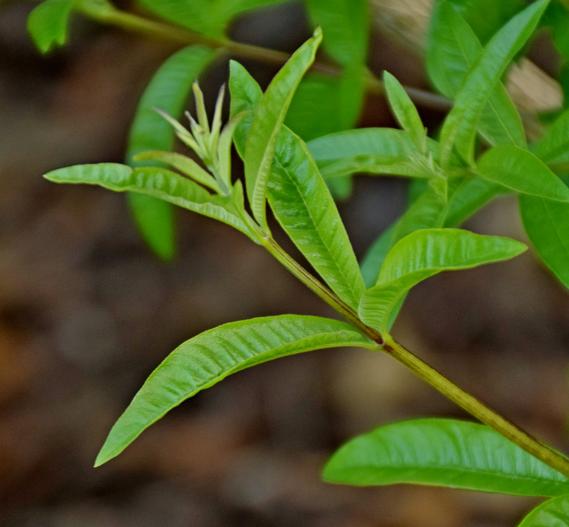Lemon Beebrush
(Aloysia citriodora)
Lemon Beebrush (Aloysia citriodora)
/
/

Krzysztof Golik
CC BY-SA 4.0
Image By:
Krzysztof Golik
Recorded By:
Copyright:
CC BY-SA 4.0
Copyright Notice:
Photo by: Krzysztof Golik | License Type: CC BY-SA 4.0 | License URL: https://creativecommons.org/licenses/by-sa/4.0 | Uploader: Tournasol7 | Publisher: Wikipedia Commons

















Estimated Native Range
Summary
Aloysia citriodora, commonly known as Lemon Beebrush or Lemon Verbena, is a deciduous to semi-evergreen shrub native to South America, specifically the temperate regions of Chile and Argentina, where it thrives on sunny hillsides and in scrub areas. It typically grows to 2–3 meters (7–10 ft) in height. The leaves are 8 centimeters long (3 inches), glossy, pointed, and slightly rough to the touch, releasing a potent lemon scent when bruised. Lemon Beebrush produces sprays of tiny, lightly fragrant purple or white flowers in late spring or early summer, which are more abundant when grown in the ground rather than in pots.
The plant is valued for its aromatic leaves and is used extensively in culinary applications to impart a lemon flavor to a variety of dishes. It is also appreciated for its ornamental qualities, including its fragrant foliage and delicate flowers. Lemon Beebrush is suitable for herb gardens and as a container plant in colder regions. It requires full sun and well-drained soil, and it benefits from pruning in spring to maintain a bushy form. While it is evergreen in tropical climates, it is sensitive to cold and may lose leaves when temperatures fall below 0 °C (32 °F), though the wood can survive down to −10 °C (14 °F). It has been awarded the Royal Horticultural Society’s Award of Garden Merit for its desirable traits. Potential problems include leaf drop in cold weather and susceptibility to spider mites and whiteflies, especially when grown indoors or in dry conditions.CC BY-SA 4.0
The plant is valued for its aromatic leaves and is used extensively in culinary applications to impart a lemon flavor to a variety of dishes. It is also appreciated for its ornamental qualities, including its fragrant foliage and delicate flowers. Lemon Beebrush is suitable for herb gardens and as a container plant in colder regions. It requires full sun and well-drained soil, and it benefits from pruning in spring to maintain a bushy form. While it is evergreen in tropical climates, it is sensitive to cold and may lose leaves when temperatures fall below 0 °C (32 °F), though the wood can survive down to −10 °C (14 °F). It has been awarded the Royal Horticultural Society’s Award of Garden Merit for its desirable traits. Potential problems include leaf drop in cold weather and susceptibility to spider mites and whiteflies, especially when grown indoors or in dry conditions.CC BY-SA 4.0
Plant Description
- Plant Type: Shrub
- Height: 2-4 feet
- Width: 2-4 feet
- Growth Rate: Moderate
- Flower Color: Pink, White
- Flowering Season: Summer, Fall
- Leaf Retention: Deciduous
Growth Requirements
- Sun: Full Sun
- Water: Medium
- Drainage: Medium, Slow
Common Uses
Bee Garden, Bird Garden, Butterfly Garden, Edible*Disclaimer: Easyscape's listed plant edibility is for informational use. Always verify the safety and proper identification of any plant before consumption., Fragrant, Hummingbird Garden, Low Maintenance, Potted Plant, Salt Tolerant, Street Planting
Natural Habitat
Native to sunny hillsides and scrub areas in the temperate regions of Chile and Argentina
Other Names
Common Names: Lemon Verbena
Scientific Names: Aloysia triphylla , Aloysia citriodora , Zapania citrodora
GBIF Accepted Name: Aloysia citriodora Palau